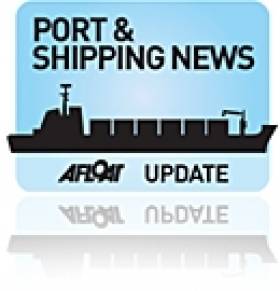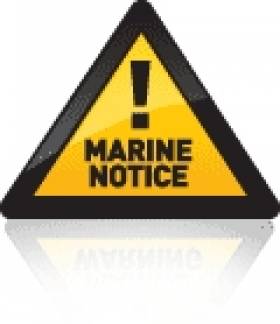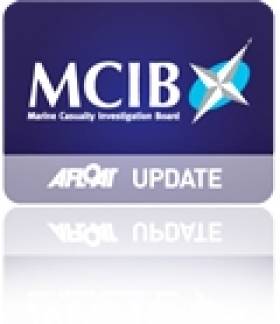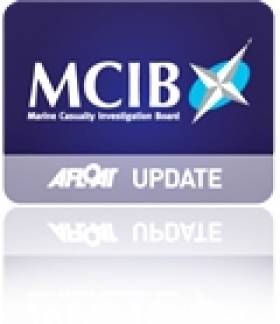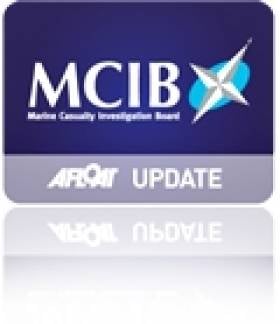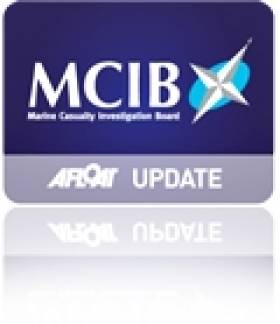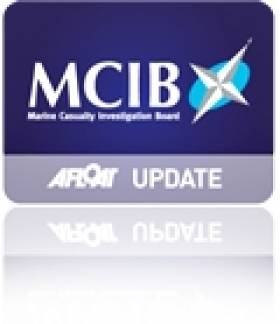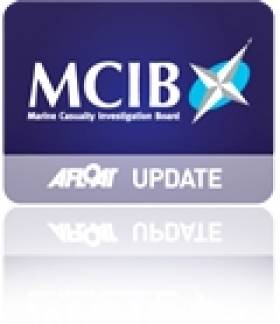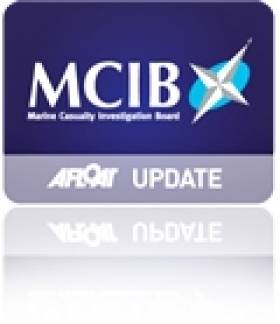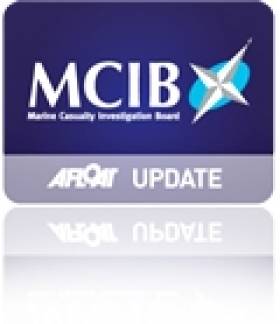Displaying items by tag: MCIB
Grounded Arklow Bank Containership Arrives in Turkish Waters
#ShipsRudder - As previously reported on Afloat.ie, containership Arslan II (1991/3,125grt) that grounded on Arklow Bank in January, and understood to have damaged her rudder, arrived off Turkey in recent days, writes Jehan Ashmore.
Following the incident off Co. Wicklow, the 260 TEU container capacity vessel had been towed to Dublin Port to seek refuge and repairs following a port state authorities control inspection.
The vessel was dry-docked for a month at the Dublin Dry Docks facility within Alexandra Basin from where further steel works were required.
In total the 89m vessel remained in Dublin Port for more than two months between initial berthing and dry-docking until finally she departed on a 14-day voyage to Turkey. Her course in the Mediterranean involved passing coastlines offshore of some North African states as far as Tunisia.
She continued sailing south of Sciliy and eventually arrived off Aliaga, where she was at anchorage off the major shipbreaking centre which lies outside the western Turkish port.
The ships owners are understood to be awaiting further instructions as she is to undergo further repairs and as of this morning she is underway again to another ship repair facility.
In the meantime, the grounding incident remains under investigation by the Marine Casualty Investigation Board (MCIB).
Arslan II until her sale last year was previously named Coastal Isle. She was a frequenct caller to Dublin Port and having been featured as file footage regularly for RTE News particularly relating to stories on the balance of trade and Irish exports. A role she played her part in bringing exports and imports for the last three decades and starting off under original name of Johanna.
Her sister, Coastal Deniz (see former Guinness ships) operates a Liverpool - Manchester container shuttle-service and they both previously served a network linking the major Irish Sea ports between Belfast, Dublin,Liverpool and Cardiff.
As Arslan II she is understood to have operated to ports among them Warrenpoint and again returning to the Welsh capital.
Marine Notice: Revision Of Code Of Practice For Small Fishing Vessels
#MarineNotice - Marine Notice 14 of 2014 advises that a revised Code of Practice concerning the Design, Construction, Equipment and Operation of Small Fishing Vessels of less than 15 metres length overall (Revision 2 dated 20/01/14 with operative date of 03/03/14) has been published.
The revision incorporates provisions relating to the carriage of automatic, float-free EPIRBs for fishing vessels of under 12 metres and for the wearing of Personal Locator Beacons by all on board a fishing vessel (Chapter 9.5). Training is also required on the use of this equipment (Chapter 8).
These requirements will be included in the scope of the initial survey, survey renewals and at intermediate declaration stage. There are other textual changes reflecting feedback from the industry, surveyors and findings of the Marine Casualty Investigation Board. These include:
- The title of the code has been updated to reflect the inclusion of operational matters;
- Stability criteria remain essentially the same but ‘roll tests’ now need to be carried out both in ‘departure’ and ‘arrive port’ conditions (Chapter 3.2);
- Existing requirements in relation to drills/musters (Chapter 8.9) and the regulation of work/rest time (Chapter 8.10) have been included in the Code;
- Text has been included to remind fishers of their existing obligations to comply with passage planning requirements (Chapter 10.14);
- The Declaration form (Annex 8) has been updated and clarified so as owners and panel surveyors are clear of their obligations under the Code;
- and References to bodies and Marine Notices, etc have been updated.
A copy of the revised Code of Practice is available on the Department’s website HERE. The most recent listing of the approved panel of surveyors and their contact details is also available via the previous link.
Call For Mandatory Smoke Detection On Smaller Fishing Vessels After Kingfisher Fire
#MCIB - The absence of a smoke detection system meant there was no chance for the two-man crew of a Waterford fishing boat to extinguish a fire that engulfed its engine room in an incident off Dunmore East in November 2012.
And marine investigators have urged the Minister for Transport to make such systems a mandatory requirement for all small fishing vessels, according to their official report on the FV Kingfisher.
As previously reported on Afloat.ie, the skipper and crew of the Kingfisher were rescued on the morning of 25 November 2012 after abandoning the vessel to a liferaft.
The Kingfisher had been pair trawling for herring some five miles off Dunmore East with partner vessel FV Mystical Rose when the skipper noticed smoke coming from the exhaust pipe housing on deck.
On opening the engine room hatch, the wheelhouse was quickly engulfed in thick acrid smoke - indicating an oil-based fire - that prevented skipper or crew from making any attempt to put out the fire or even raise the alarm by VHF radio.
Both men on board were retrieved from their liferaft by the Mystical Rose as the Dunmore East lifeboat attempted to extinguish the blaze, with assistance by the Irish Coast Guard helicopter Rescue 117, but to no avail.
In its report, the Marine Casualty Investigation Board (MCIB) determined that the fire was likely too far advanced at the point of discovery to be suppressed by the vessel's sprinkler system or any other means at hand.
The report also noted, importantly, that smoke detection systems are not mandatory for vessels of the Kingfisher's size (less than 15 metres), nor are such boats' bulkheads, deckheads or piping stems required to have any fire-resistant properties.
The MCIB has recommended that the Minister for Transport amend the current Code of Practice for the Design, Construction and Equipment of Small Fishing Vessels of less than 15m Length overall. The full report is available to download below.
MCIB Publish Report on M.V. Huelin Dispatch
#MCIBreport – A report into the 2012 incident of the Irish flagged "MV Huelin Dispatch" has been recently published by the Marine Casualty Investigation Board.
As reported on Afloat.ie, the then brand new containership during its maiden voyage to the Channel Islands struck a rock off Alderney in the English Channel.
To download the report about the Dutch built 2,545grt cargo vessel, click this link from the MCIB website.
MCIB Publish Fatal Powerboat Accident Report on Lough Derg
#powerboat accident – The Marine Casualty Investigation Board (MCIB) has released details of a fatal powerboat accident near Garrykennedy on Lough Derg from 2012.
On the morning of 2nd August 2012, Mr Patrick Danaher purchased fuel for his powerboat at New Line, Killaloe.
That evening, the boat was seen floating partially submerged and overturned with the bow out of the water near Youghal Bay, Lough Derg. Afloat.ie's news report at the time of the capsize is here.
The boat had struck submerged rocks at high speed and suffered major damage to the outdrive allowing the free ingress of water into the boat.
The boat was recovered that evening and Mr Danaher's body was recovered from the lake the following day.
In its conclusions the MCIB said the boat and its machinery were in good condition and did not contribute to the incident.
The displacement of the outdrive port side pivot pin was not significant in the incident.
At the time of the incident the boat was being driven at high speed close to the shoreline.
The post mortem results show that the ethanol levels in Mr Danaher's blood and urine were within the toxic range. However, the influence of alcohol may have affected his ability to:
• effectively apply his local knowledge and experience
• make rational decisions in respect of the speed of the boat and its course
• recognise the danger of driving the boat in such close proximity to the small headland and the submerged rocks adjacent to the headland.
Mr Danaher did bring the control lever to the neutral position and shut down the engine at the time of the incident.
The full report is downloadable here as a PDF file.
MCIB Publish Collision Report Between MV Stena Europe & MV Oscar Wilde
A report into a collision at Rosslare Europort between the "MV Stena Europe & MV Oscar Wilde" has been published recently by the Marine Casualty Investigation Board.
On 26th October 2012 the passenger car ferry M/V "Stena Europe" was berthing on No.3 Berth Rosslare Harbour.
During the berthing operation the average wind speed increased to 36 knots with gusts up to 45 knots and the vessel lost control and collided with another passenger car ferry the M/V "Oscar Wilde" which was berthed on No.2 Berth. Minor damage was sustained by both vessels.
The M/V "Oscar Wilde" was not taken out of service and the M/V "Stena Europe" cancelled one sailing. There was no injury to persons during the incident.
The full MCIB report is downloadable below as a pdf file
Fisherman Drowned 100 Metres From Shallows Says MCIB Report
#MCIB - Various factors - including poor buoyancy, suboptimal lifejackets and a fateful late decision to swim to shore - have been identified in the official report into the death of a fisherman off the Waterford coast earlier this year.
As previously reported on Afloat.ie, a major search and rescue operation was launched on 10 January when a 16-foot fishing punt capsized in a strong swell at the sandbar off Brownstown Head near Dunmore East, throwing its two-man crew overboard.
James Tate was able to swim to the nearby shore in the early morning darkness after some two hours in the water. But he became separated from his friend Johnny Flynn - a former member of the Dunmore East lifeboat crew - who was found unconscious in the water by coastguard helicopter before 8.30am.
Flynn was pronounced dead at Waterford Airport shortly after, with a post-mortem concluding that he cause of death was drowning.
The tragedy occurred six years to the day after the sinking of Dunmore East trawler the Pere Charles, which took five lives.
In the official report into the incident, the Marine Casualty Investigation Board (MCIB) found that the fishing punt, already vulnerable to breaking waves as an un-decked open boat, was more susceptible due to its waterlogged condition, and the lack of adequate buoyancy.
It was also found that neither the vessel's handheld VHF radio nor GPS device, or indeed Tate's mobile phone, were available to the pair after the boat turned turtle.
Though both men were wearing lifejackets, they were of a kind that lacked a collar that would have kept the deceased's head above water, nor did they have a light or whistle. Only Tate was equipped with any kind of light, so he could not locate his friend in the dark.
Most importantly, it was found that the boat had overturned within 100 metres of the shallows, so that if the pair had attempted to swim to shore earlier - rather than tire themselves out trying to climb onto the upturned hull - the chances of both men surviving the incident "would have been greatly enhanced".
The full report into the incident is available to download below.
#MCIB - Marine investigators have emphasised the dangers of drinking while at sea in the official report into the death of a lobster fisherman off Galway in April last year.
The body of Gerard Folan was recovered from the waters off St MacDara's Island, near Carna in Co Galway, on the morning of 24 April 2012 after he was reported missing the night before.
According to the report into the incident by the Marine Casualty Investigation Board (MCIB), Folan had set off in his currach from Dooeyher Pier in Carna around lunchtime on 23 April to check on lobster pots some 3nm away, off Deer Island - promising to contact his father on his return.
Folan was shortly after observed by another fisherman in the area, and was reportedly not wearing an oilskin nor a lifejacket.
Some hours later Folan's father went around the local piers but did not find his son. Later still, Folan's ex-wife contacted Clifden Coast Guard to report his disappearance and a search effort was mobilised.
Early the next morning, before the search resumed at first light, the fishing vessel Ocean Breeze sighted a drifting currach that was found to be Folan's. His body was later recovered off St MacDara's Island around 11am.
According to the MCIB report, it was not possible to determine how Folan became separated from his boat, though it was found that the currach's outboard engine had no kill cord attached, so it is probable the engine was running and the boat motored out of reach when he went overboard.
Although Folan was regarded as a strong swimmer, the post-mortem found elevated levels of alcohol in his bloodstream, which the MCIB report said would have hindered his attempts to swim back to his vessel.
Investigators also highlighted the "undue delay" in raising the alarm when Folan has failed to return earlier on the evening of 23 April.
The full report into the incident is available to download below.
Dinghy Drowning Report Blames Poor Planning
#MCIB - Marine investigators have reiterated the importance of boaters informing people ashore of planned trips in their report into the drowning of a dinghy sailor in West Cork last autumn.
As reported last August on Afloat.ie, an afternoon sail by a father and son from the Beara Peninsula ended in tragedy after their Enterprise sailing dinghy capsized.
The body of John O'Leary from Allihies was found around 1.30am on Tuesday 14 August, just hours after he and his 18-year-son Christy had abandoned their overturned vessel to attempt the swim to shore.
The official report by the Marine Casualty Investigation Board (MCIB) found that the two had been sailing without incident in the area between Cod's Head and the Cullogh Rock for an hour or so before a gust of wind flipped their dinghy.
Unable to right the vessel, the O'Learys rested on the upturned hull to await assistance. But after many hours had passed and suspecting that the hull was starting to sink, they decided to swim to the shoreline some 800 metres away.
With 200 metres to go, John O'Leary encouraged his son to swim ahead to raise the alarm, which he did minutes later. But in the interim John went missing.
Some time into the search operation launched immediately by Castletownbere RNLI and assisted by the Irish Coast Guard from Allihies, John O'Leary's lifejacket was found in the water, and his body was located shortly after.
The MCIB report found that the Enterprise dinghy the O'Learys were sailing is of a kind notorious for its difficulty to right after capsizing. It was also noted that the craft had an insufficient buoyancy bags, which made it even more difficult to bail out once overturned.
But more importantly, the report found that John O'Leary, as skipper of the dinghy, had not arranged a return time or sailing area with anyone on shore prior to the trip.
"If he had done this, the rescue may have occurred before they decided to enter the water," the report said.
Neither man was wearing a wetsuit, exposing them to "the cold and stresses from the cold" which may have "impaired their decision making process" and prompted their decision to swim from the vessel, it added.
In its recommendations, the MCIB advises all sailors to inform a responsible person ashore of their itinerary, and to stay with their vessel as long as possible in the event of any incident on the water.
The full report into the dinghy capsize is available to download below.
Loss of Buoyancy Led to Drowning of Lady Eileen Crew - MCIB
#MCIB - Overloading of the boat deck and a missing hatch at the stern may have caused a fatal loss of buoyancy that led to the drowning of two fishermen off Co Clare last year, according to the official report into the incident.
As previously reported on Afloat.ie, the remains of the two fishermen were found by local divers at the wheelhouse of their sunken boat near Spanish Point on 14 August 2012 during a search operation for the fishing vessel Lady Eileen.
Their craft had been reported missing the previous day after they failed to return from a trip to mend snagged nets, and a massive search operation was mounted after debris and diesel were discovered in the water close to Spanish Point that evening.
The two men lost were later named as owner/skipper Michael Galvin and crew Noel Dickinson, both of Quilty in Co Clare.
In its official report into the incident, the Marine Casualty Investigation Board (MCIB) found that the vessel had a low freeboard, such that even in an unladen condition it would not have to heel by a significant degree to take water on the deck.
With the weight of nets and the seawater tank used to store crustaceans, the vessel's freeboard was reduced such that water would be allowed to "flow freely on to the deck even in very calm weather conditions". This is water that would not be quickly released, with potentially very serious effects on the craft's buoyancy.
In addition, a panel removed by Galvin some weeks before to do repair work on the sterngear appeared not to have been replaced, possibly allowing a catastrophic amount of water on deck if the boat encountered wind or wave action.
With no witnesses to the incident it is unknown exactly what happened to cause the boat to be swamped, though it is thought to have transpired very quickly as neither man was wearing a lifejacket and the boat's manually operated emergency beacon in the wheelhouse was not activated.
Among the MCIB's recommendations is that the Minister for Transport reviews the Code of Practice for fishing vessels under 15m to devise new stability criteria.
Volunteers participating in search operations have also been urged to co-ordinate their assistance, after an open boat with three on board was capsized by waves while searching for the Lady Eileen and its crew.
All were thrown overboard though were quickly rescued by Garda divers in the area.
The full report from the MCIB is available to download below.



























